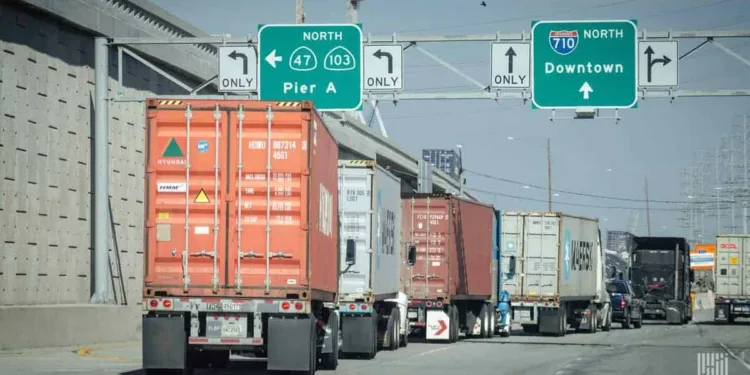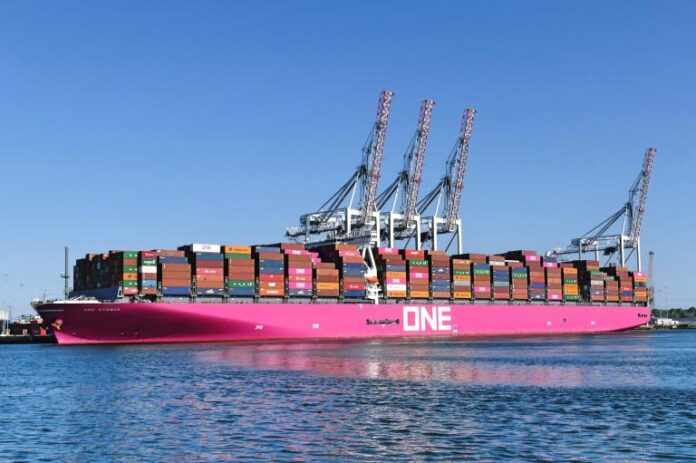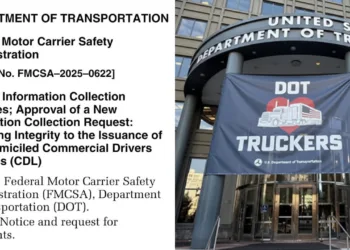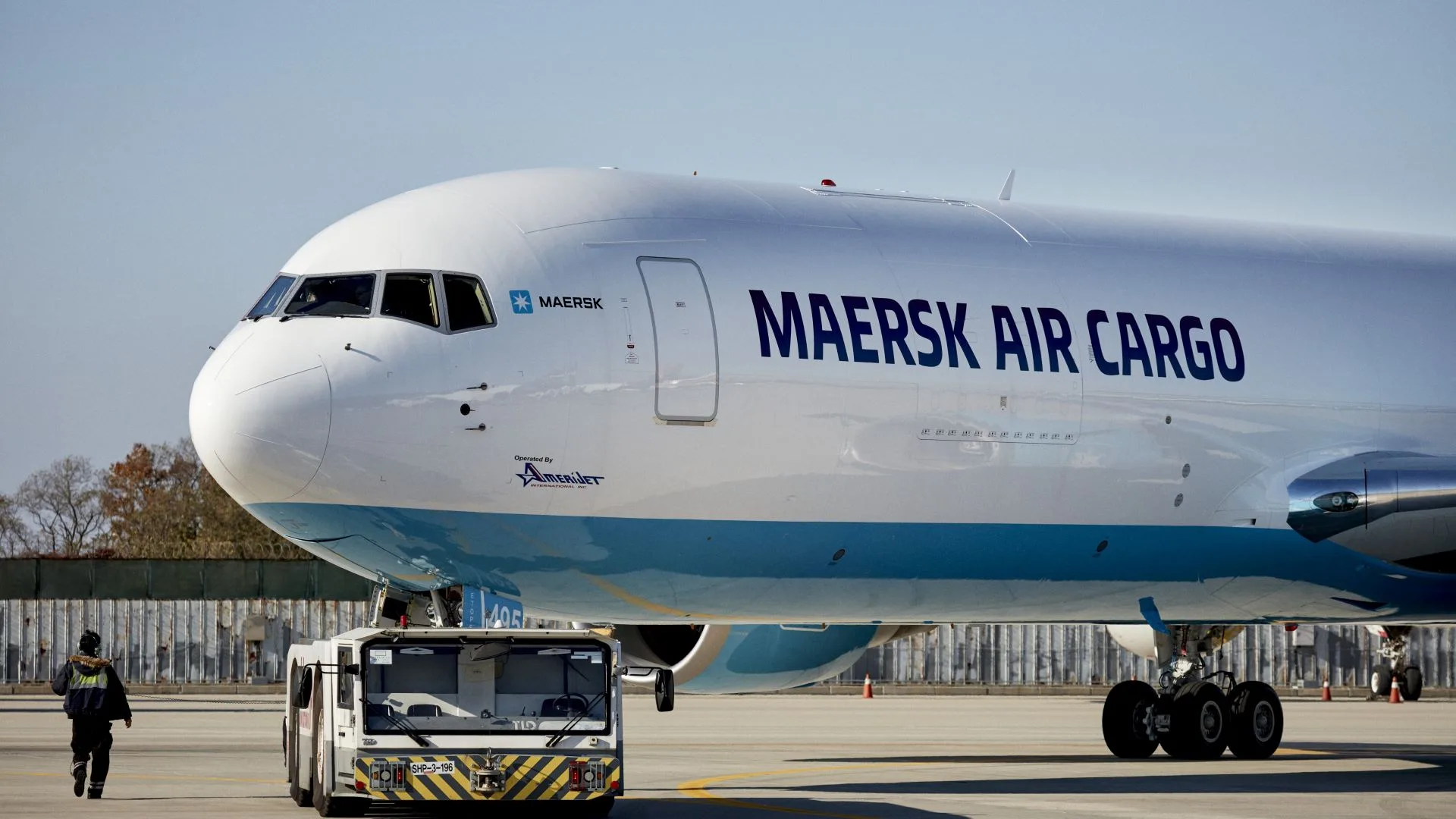California’s Clean Truck Check (CTC) rule, also known as the Heavy-Duty Inspection and Maintenance regulation, is the latest Golden State mandate under fire from the Trump administration.
In a prepared statement released Monday, EPA administrator Lee Zeldin said the agency is “proposing to disapprove” the rule. The headline on the prepared statement from the EPA described the CTC as the “latest illegal power grab on heavy-duty vehicles.”
CTC is relatively recent but is not new. The first mandate came at the end of 2023 when trucks needed to register with the state. Enforcement of the rule, which requires downloading data from a truck’s onboard diagnostic equipment, began in mid-2024.
The CTC itself does not appear to be at risk as a regulation in-state trucks must follow. Rather, the EPA’s targets are the CTC inspections that California has mandated for out-of-state trucks operating in the state. They are subject to CTC and can be fined for violations of the clean air rules the CTC is designed to help enforce.
Not a GHG rule
The CTC does not target a reduction in greenhouse gas emissions like the state’s Advanced Clean Trucks (ACT) rule. Rather, it is focused on pollutants that can create smog or increase the level of particulate matter in the atmosphere.
Unlike ACT or the state’s Omnibus NOx rules, the CTC did not require an EPA waiver to be implemented. The EPA statement does not allege that it did.
Rather, the issue is one of whether the rule can apply to trucks that are not based in California but cross state lines to do business there.
“EPA is proposing to deny these actions due to concerns that this requirement violates the U.S. Constitution’s Commerce Clause,” the agency said in a prepared statement. The EPA also said California’s actions may violate section 110 of the Clean Air Act, which deals with the State Implementation Plans (SIPs) that govern the interplay between state clean air actions and the federal government.
The California Air Resources Board (CARB), in past published statements on the CTC, said its goal was to “ensure heavy-duty vehicles operating in California are well-maintained and repaired rapidly when needed, and promote a level playing field for the businesses that operate them.”
CARB also called it “one of the most impactful regulations approved in recent CARB history.” Its specific projections were that CTC would cut California NOx emissions by more than 81 tons per day and emissions of particulate matter by 0.7 tons per day in 2037. “Together, these emissions reductions will result in over 7,500 avoided premature deaths,” it said.
Required SIP filing is targeted by EPA
The SIP is an ongoing regulation rather than a required deadline filing, according to Craig Segall, the former deputy executive officer and assistant chief counsel of CARB.
Segall said states need to regularly make submissions to EPA under their respective SIPs. Approval by EPA for state actions filed under their SIP grants states the ability to implement their proposed rules–like the CTC–and can protect the state in legal actions, Seagall said.
“EPA can disallow part of it under the SIP, as they’re proposing to do here,” Segall said. But the broader CTC that would impact California-based trucks “will still be in place.”
He also said EPA publishes its plans regarding actions on a state’s SIP in the Federal Register. “The most they can do here is to say, we don’t have to approve that part” about enforcing CTC against out-of-state trucks.
The CTC exists, Segall added, because “EPA spent years telling California that it needed to focus more on smog and particulates. That’s what this is.”
In two recent actions by the Trump administration against California’s environmental rules, Congress first targeted EPA waivers granted for the ACT and the Omnibus NOx rule through the Congressional Review Act. It then filed suit against the state’s Clean Truck Partnership through the Justice Department earlier this month.
To battle the CTC, the EPA is proposing a rulemaking process. EPA said in its statement that its Federal Register notice would have “proposed partial disapproval and partial approval.” It would be open for comments, as are all Federal Register rulemaking notices.
Compared to some of the regulations that have been targeted by various federal government agencies in recent weeks, such as ACT and the Omnibus NOx rule, the CTC has been described as less onerous than those other regulations that the federal government says are now dead but which California is fighting to keep alive.
A quick data download
Tom Bray, an industry business advisor with JJ Keller, a safety and regulatory compliance consulting company, said the onboard diagnostic download required under CTC generally takes about five minutes to perform. The current requirement is that it be done twice a year though the rule eventually will boost that to four times annually.
Out-of-state companies licensed to do so can perform the diagnostic download, Bray added. It does not need to be performed in California.
Newer trucks with cleaner engines, Bray said, “should have no problems at all, unless it’s been tampered with.” Failing the diagnostics standards under CTC is more likely with older model engines, Bray added.
But despite that relative operational ease, the CTC is not popular, according to Bray. There has been no obvious push from any trucking associations to gut the law, he said, “but this has been very unpopular with a lot of carriers. So somebody complained to somebody. That’s likely how the sequence went.”
“There are carriers that just don’t like this,” Bray said. “It’s another thing they have to do that they don’t want to do.”
CARB, under pressure on numerous fronts from the Trump administration, issued a statement late Monday with familiar themes.
“Today’s announcement by the U.S. EPA is just another proposal by the current federal administration to evade its obligations under the law and illegally interfere with states’ lawful authority to act within their borders to improve air quality for the benefit and protection of its residents,” the statement said. “California will not be deterred in its fight to provide the basic right of clean air to its people and to use the tools needed to attain federal clean air standards.”
The statement added that the CTC remains in effect for heavy duty vehicles over more than 14,000 pounds operating in the state.
More articles by John Kingston
NFI driver misclassification case in New Jersey could reach individual payouts of $50k
New Jersey truckers await–with dread–possible changes in state’s independent contractor law
American Trucking Associations hit with allegations of employment and race discrimination
The post Trump administration has a new California target: out-of-state mandate for its Clean Truck Check appeared first on FreightWaves.



















